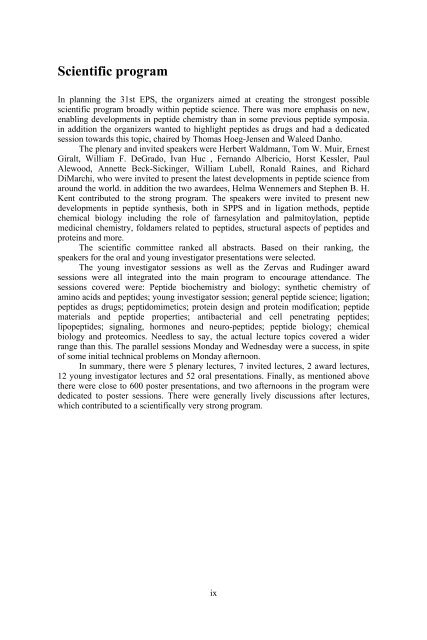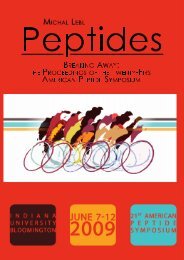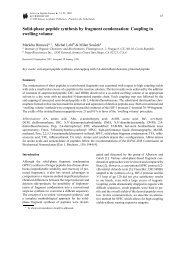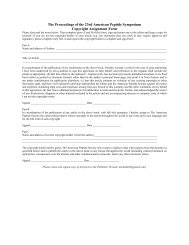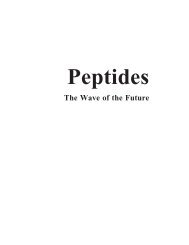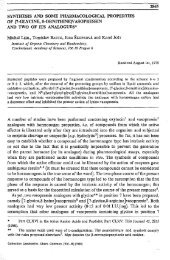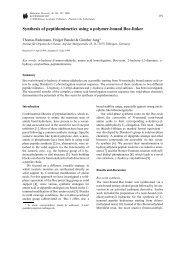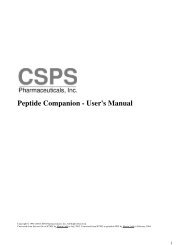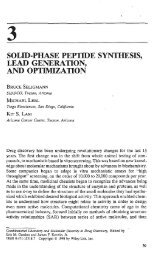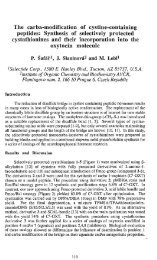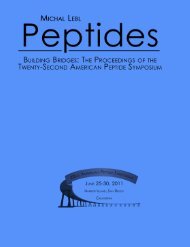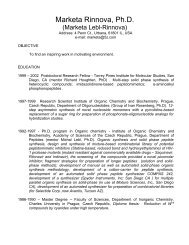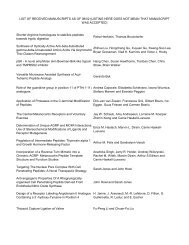- Page 2 and 3: Peptides 2010Tales of PeptidesProce
- Page 4 and 5: Peptides 2010Tales of PeptidesProce
- Page 8 and 9: IntroductionWe had the distinct hon
- Page 12 and 13: Message from the Chairman of the Eu
- Page 14: Local organizing CommitteeJens Buch
- Page 20 and 21: European Peptide SymposiaSymposium
- Page 22 and 23: The 2010 Leonidas Zervas AwardThe L
- Page 24 and 25: Dr. Bert L. Schram Poster Awards:Th
- Page 26 and 27: Table of ContentsN-Pi Interactions
- Page 28 and 29: Radical Scavenging Activity of Hydr
- Page 30 and 31: Computational Study on Helical Stru
- Page 32 and 33: Automated Microwave-Assisted Peptid
- Page 34 and 35: Peptide Nucleic Acids with Chiral B
- Page 36 and 37: Role of Triple Hyp-Pro Substitution
- Page 38 and 39: Mechanism in Inhibition of Histone
- Page 40 and 41: Lasiocepsin: Novel Antimicrobial Pe
- Page 42 and 43: N-Linked Homodimers of the Kinin B1
- Page 44 and 45: Synthesis and Biological Evaluation
- Page 46 and 47: Molecular Modeling of Single and Mu
- Page 49 and 50: Proceedings of the 31 st European P
- Page 51 and 52: Proceedings of the 31 st European P
- Page 53 and 54: Proceedings of the 31 st European P
- Page 55 and 56: Proceedings of the 31 st European P
- Page 57 and 58: Proceedings of the 31 st European P
- Page 59 and 60: Proceedings of the 31 st European P
- Page 61 and 62:
Proceedings of the 31 st European P
- Page 63 and 64:
Proceedings of the 31 st European P
- Page 65 and 66:
Proceedings of the 31 st European P
- Page 67 and 68:
Proceedings of the 31 st European P
- Page 69 and 70:
Proceedings of the 31 st European P
- Page 71 and 72:
Proceedings of the 31 st European P
- Page 73 and 74:
Proceedings of the 31 st European P
- Page 75 and 76:
Proceedings of the 31 st European P
- Page 77 and 78:
Proceedings of the 31 st European P
- Page 79 and 80:
Proceedings of the 31 st European P
- Page 81 and 82:
Proceedings of the 31 st European P
- Page 83 and 84:
Proceedings of the 31 st European P
- Page 85 and 86:
Proceedings of the 31 st European P
- Page 87:
Proceedings of the 31 st European P
- Page 90 and 91:
parallel, we developed the cell-per
- Page 92 and 93:
BocHNSEMOBO OONH5bOHNISEMOORink-MBH
- Page 94 and 95:
Fig. 3. X-Ray diffraction structure
- Page 96 and 97:
Table 1. Molar conversion yields of
- Page 98 and 99:
with piperidine were obtained. For
- Page 100 and 101:
Fig. 1. Formation of a DKP thioeste
- Page 102 and 103:
Fig. 1. CD spectrum of oxytocin (OT
- Page 104 and 105:
Table 2. Results of evaluation of r
- Page 106 and 107:
NHHNOONHHNO+HOOHRHNONHO N H OOHOHHN
- Page 108 and 109:
45401x10 -3 M concentrationStabiliz
- Page 110 and 111:
35302520151050-5-10100 200 300 400
- Page 112 and 113:
1+H 2O1RHHCOH 1 2HC N C COOHRHCHOHC
- Page 114 and 115:
Fig. 1. NA free of metal (left) and
- Page 116 and 117:
O+ZHNOONbzOHH +ZHNOOONbzH + OROH R=
- Page 118 and 119:
ONH 2CHCNSONHH 2COCH 2COCH 2CH 2NCH
- Page 120 and 121:
Fig. 2. α-Tfm-Alanine containing d
- Page 122 and 123:
Fig. 3. Synthesis of (S)- and (R)-
- Page 124 and 125:
Fig. 3. Preparation of C-terminal C
- Page 126 and 127:
aliphatic amines (Figure 1) as deca
- Page 128 and 129:
Fig. 2. Synthesized -chloromethyl k
- Page 130 and 131:
Table 1. Irradiation times (t irr i
- Page 132 and 133:
Table 1. Peptides which were reacte
- Page 134 and 135:
Θ / (deg cm 2 dmol -1 )synthesis o
- Page 136 and 137:
polymyxin bicyclic peptide analogue
- Page 138 and 139:
Lys Phe GlnZ OBzl Z OH H OBu tTBTU/
- Page 140 and 141:
Table 1. Synthesis of tetrahydro-β
- Page 142 and 143:
Table 1. Synthesis of Fmoc-aza-β 3
- Page 144 and 145:
The effect of dimeric analogs on th
- Page 146 and 147:
acids were incorporated using the F
- Page 148 and 149:
Table 1. Synthetic protocol in Libe
- Page 150 and 151:
α,β-unsaturated ketones in protic
- Page 152 and 153:
Table 1. Overall yield of N β -Fmo
- Page 154 and 155:
concentration (40 mg of the linear
- Page 156 and 157:
Fig. 3. Activity of CovX-Bodies in
- Page 158 and 159:
obtained in 80% yield (Scheme 2). T
- Page 160 and 161:
Fig. 1. (A) Reduced-form amylin(1-1
- Page 162 and 163:
Table1. Conformational search with
- Page 164 and 165:
conditions and the subsequent coupl
- Page 166 and 167:
Table 1. Molecular properties of Zw
- Page 168 and 169:
Table 1. Cyclization of linear O-ac
- Page 170 and 171:
all the final results of the synthe
- Page 172 and 173:
According to HPLC, purity of the cr
- Page 174 and 175:
Synthesis of the peptide bond in aq
- Page 176 and 177:
tert-butylcarbonylation of the hydr
- Page 178 and 179:
AcknowledgmentsThis work was partia
- Page 180 and 181:
We next sought practical conditions
- Page 182 and 183:
Table 1. Overview of the synthesize
- Page 184 and 185:
Fig. 2. Crude synthetic and prepara
- Page 186 and 187:
amine of the previous amino acid in
- Page 188 and 189:
SHCH 3Ocyclication/pH 7.5OON(AA)nON
- Page 190 and 191:
Results and DiscussionLinear cyclov
- Page 192 and 193:
Table 1. Fragments obtained from cl
- Page 194 and 195:
NMR-analysis allowed full structura
- Page 196 and 197:
Table 2. IC50 values for the bindin
- Page 198 and 199:
Detection of Fm-Pip (= 301 nm)UV de
- Page 200 and 201:
OHONBocO OSH 2 NO 2 SOO Ni ii iiiON
- Page 202 and 203:
Coupling between the mono-6-deoxy-
- Page 204 and 205:
AB0 50 100 150Fig. 3. Yeast cells w
- Page 206 and 207:
Fig. 2. Analytical HPLC of the prod
- Page 208 and 209:
The canonic M2e epitope entailed co
- Page 210 and 211:
Fig. 2. 1 H- 15 N HSQC spectra of 1
- Page 212 and 213:
Fig. 1. Planetary ball-mill for the
- Page 214 and 215:
Fig. 2. TAMRA cross-reaction. (A)Fl
- Page 216 and 217:
Scheme 1. On-resin peptide cyclizat
- Page 218 and 219:
Fig. 2. Analytical RP-HPLC of (A) p
- Page 220 and 221:
Table 1. Integration results of RP-
- Page 222 and 223:
Table 1. Coupling conditions for th
- Page 224 and 225:
Table 1.Cyclization of H-Ala-Ala-Me
- Page 226 and 227:
Table 1. Thermodynamic and kinetic
- Page 228 and 229:
Table 1. A summary of synthesis yie
- Page 230 and 231:
In order to minimize the volume of
- Page 232 and 233:
MeOOMeHN8OOOa -fH 2 NH 2 NOHX'NHNHO
- Page 234 and 235:
Fig. 1. HPLC of crude [Asn 641Fig.
- Page 236 and 237:
Table 1. Room temperature- vs MW-as
- Page 238 and 239:
Fig. 2. LC-MS analyses of final pro
- Page 240 and 241:
Table 1. Racemization during SPPS o
- Page 242 and 243:
Response (RU)201816141210864200 5e-
- Page 244 and 245:
Table 1. Sonogashira cross-coupling
- Page 246 and 247:
observed for few residues including
- Page 248 and 249:
Intens.x108Dppa-Gly-Arg-Thr-Leu (L)
- Page 250 and 251:
ones most susceptible for proteolys
- Page 252 and 253:
Table 1. Yields of peptide segments
- Page 254 and 255:
H 2NSOONHHHNONOONHHHNNOOOONHHHNNOOO
- Page 256 and 257:
Table 1. Yields of selected crude p
- Page 258 and 259:
peptides (2,7,9) were unable to red
- Page 260 and 261:
Table 1. Summary of peptide synthes
- Page 262 and 263:
H peptide Aa N1-4aSSDisulfide bridg
- Page 264 and 265:
number of conditions were screened
- Page 266 and 267:
Scheme 3. Synthesis of thioacid fro
- Page 268 and 269:
Fig. 2. Secondary structure of hete
- Page 270 and 271:
Fig. 3. Comparison of conventional
- Page 272 and 273:
HO 2 CXY6a 3,5-diamino-6b 3-amino-4
- Page 274 and 275:
Table 1. Inhibitory activity of the
- Page 276 and 277:
significant when it is greater or e
- Page 278 and 279:
Table 1. IC 50 in µmol; Cell lines
- Page 280 and 281:
Scheme 2.Fig. 3. Three representati
- Page 282 and 283:
Coupling was done by the TBTU metho
- Page 284 and 285:
present in cell walls of Gramnegati
- Page 286 and 287:
Table 1. Inhibition of FP-2 (%) at
- Page 288 and 289:
Table 1. Sequences and MIC activity
- Page 290 and 291:
Table 1. Diastereoselectivity studi
- Page 292 and 293:
Research work on Myelin: In our stu
- Page 294 and 295:
Table 1. In vitro antihypertensive
- Page 296 and 297:
alkylating agent 4, in the presence
- Page 298 and 299:
Table 1. Kinetic parameters of KIII
- Page 300 and 301:
andom sampling algorithms. The star
- Page 302 and 303:
Binding assays and digestion assays
- Page 304 and 305:
Fig. 1. Far UV CD spectra in water
- Page 306 and 307:
Fig. 3. RP-HPLC of DualAG, A: 0.1%T
- Page 308 and 309:
Interaction between positively char
- Page 310 and 311:
Fig. 1. Antitumor activity against
- Page 312 and 313:
Biological results:By varying the l
- Page 314 and 315:
the scaffold, sequentially modified
- Page 316 and 317:
Pictet-Spengler reaction with p-nit
- Page 318 and 319:
The cell translocation ability of Q
- Page 320 and 321:
We have developed these modules in
- Page 322 and 323:
Fig. 3. GC-MS n analysis of culture
- Page 324 and 325:
Table 1. The quantity of identified
- Page 326 and 327:
protocol previously described [2].
- Page 328 and 329:
(pH=6.5) and 1.0 M sodium acetate)
- Page 330 and 331:
Replacement of residue Leu68 by hyd
- Page 332 and 333:
Human cystatin C as a protein conta
- Page 334 and 335:
Cyst-13 complex. Literature data su
- Page 336 and 337:
Table 1. Results of extraction/exci
- Page 338 and 339:
Table 1. Proteins identified by MAL
- Page 340 and 341:
Table 1. Evaluation of the inhibiti
- Page 342 and 343:
They were the sequences: RCTGVSVIRR
- Page 344 and 345:
Fig. 2. 2D-FL spectra of the fiftee
- Page 346 and 347:
antiviral activity against both vir
- Page 348 and 349:
Table 1. Cytotoxicity (IC 50 ) a of
- Page 350 and 351:
ClClHNO R 1NHR 1 =CH 2Ph, CH(CH 3)
- Page 352 and 353:
peptide also undergoes a conformati
- Page 354 and 355:
Table 1. Structure and in vitro pro
- Page 356 and 357:
Table1. Structures and activities o
- Page 358 and 359:
Table 1. Antitumor activity in vivo
- Page 360 and 361:
properties and further adaptation f
- Page 362 and 363:
Death of animals from acute toxicit
- Page 364 and 365:
350ABlood glucose level (mg/dl)3002
- Page 366 and 367:
Lys7 by alanine residue did not aff
- Page 368 and 369:
Table 1. Pharmacological properties
- Page 370 and 371:
Table 1. GI 50 values (in µM) for
- Page 372 and 373:
We also developed a very convenient
- Page 374 and 375:
The final deprotection of the prote
- Page 376 and 377:
Fig. 1. Effect of AA on PTP opening
- Page 378 and 379:
Fig. 3. Coupling strategy 2: ring c
- Page 380 and 381:
Table 1. Peptide sequences and corr
- Page 382 and 383:
R 3H 2 NONHOOHNONH 2R 3 :HNN H N NN
- Page 384 and 385:
1 2 3 4 5 6Lanes:1 - negative contr
- Page 386 and 387:
In order to prevent racemisation, C
- Page 388 and 389:
1350.66271800.5463z=4z=390(A)807060
- Page 390 and 391:
The binding of hemopressin at the C
- Page 392 and 393:
Scheme 2. Synthetic strategy for th
- Page 394 and 395:
Fig. 2. Supposed binding of Val-Pro
- Page 396 and 397:
16.1 of DhHP-6 has not daf-16 depen
- Page 398 and 399:
Table 1. HDAC inhibitory activity a
- Page 400 and 401:
These peptides were engineered succ
- Page 402 and 403:
Table 1. Binding affinity to opioid
- Page 404 and 405:
Results and DiscussionIn vivo studi
- Page 406 and 407:
HOHOROOAcNHCO-L-X-D-Glu-NH 2HOHHOHO
- Page 408 and 409:
Fig. 1. Structures of Pro 3 -TL and
- Page 410 and 411:
Fig. 2. The level of expression of
- Page 412 and 413:
Table 1. Biological assays of the s
- Page 414 and 415:
Table 4. Some nonpeptide oxytocin a
- Page 416 and 417:
Aggregated peptides per vesicle5002
- Page 418 and 419:
Fig. 2. Structures of P5 (left) and
- Page 420 and 421:
0.003AL15AL4Absorbance0.0020.001022
- Page 422 and 423:
chemically-modified functional Ad h
- Page 424 and 425:
Table 1. MIC (µM) and hemolytic ac
- Page 426 and 427:
Table 1. MIC (µM) and hemolytic ac
- Page 428 and 429:
Table 1. Antibacterial activity (MI
- Page 430 and 431:
Fig. 2. Left: CD spectra in methano
- Page 432 and 433:
Fig. 2. CD spectra in water of (⋅
- Page 434 and 435:
These methods provided the complete
- Page 436 and 437:
membrane, all peptides acquired a h
- Page 438 and 439:
The conformational preferences of s
- Page 440 and 441:
Fig. 2. 3D-Representation of the 54
- Page 442 and 443:
Table 1. Chemical characteristics a
- Page 444 and 445:
Results and DiscussionSite-directed
- Page 446 and 447:
Antibacterial activities. Each isol
- Page 448 and 449:
Fig. 2. (A) Integrated heat per inj
- Page 450 and 451:
Fig. 2. Effect of L-MCa andD-MCa on
- Page 452 and 453:
Fig. 1. Phase contrast images of GU
- Page 454 and 455:
Table 1. Antimicrobial and hemolyti
- Page 456 and 457:
(Figure 1-B). Both lymphocyte cell
- Page 458 and 459:
Fig. 1. GPMVs from RBL-2H3 cells we
- Page 460 and 461:
Vv-AMP1Vv-AMP1...vaearRTCESQSHRFKGT
- Page 462 and 463:
phosphate buffer (IGP) and was noth
- Page 464 and 465:
Table 1. Apoptogenic and translocat
- Page 466 and 467:
Fig. 1. The AMPA profile of eosinop
- Page 468 and 469:
HNOHOHOHOHNOHOAcNHO OHOOOHNH 2HO HO
- Page 470 and 471:
determine if they could retain the
- Page 472 and 473:
Fig. 2. Evolutionary diversity of p
- Page 474 and 475:
Table 1. GPI and MVD assay of TIPP
- Page 476 and 477:
Results and DiscussionThe three-dim
- Page 478 and 479:
Fig. 2. Effect of lGnRH-III, and lG
- Page 480 and 481:
Table 1. Pharmacological properties
- Page 482 and 483:
2,0x10 -5A0,0B0,0∆A = A L-A R4,0x
- Page 484 and 485:
NMeSer 4 and their counterparts. Be
- Page 486 and 487:
Table 1. Pharmacological properties
- Page 488 and 489:
chymotrypsinpepsin1. H-Tyr-D-Dap-Ph
- Page 490 and 491:
Fig. 1. Average IR and VCD spectra
- Page 492 and 493:
Table 1. Physicochemical properties
- Page 494 and 495:
Table 1. Physicochemical properties
- Page 496 and 497:
Table 1. Biological activities of o
- Page 498 and 499:
Fig. 1. The 50 last conformations o
- Page 500 and 501:
Results and DiscussionThe M1154 was
- Page 502 and 503:
Table 1. Opioid receptor binding af
- Page 504 and 505:
Table 1. Identification of neuropep
- Page 506 and 507:
[AzaPhe 4 ]GHRP-6 6Fig. 1. Circular
- Page 508 and 509:
Table 1. Analytical data and antago
- Page 510 and 511:
OD ratio33031530011060105432102/1 4
- Page 512 and 513:
Broad NH signals spread within the
- Page 514 and 515:
Fig. 3. Inhibition constants of mul
- Page 516 and 517:
Fig. 1. Antiproliferative activity
- Page 518 and 519:
Table 1. Association equilibrium co
- Page 520 and 521:
Table 1. Inhibitory activity of SFT
- Page 522 and 523:
Table 1. Antibody recognition of re
- Page 524 and 525:
Table 1. Analytical characterizatio
- Page 526 and 527:
In case of an oligonucleotide conta
- Page 528 and 529:
Table 1. Ac-peptidyl-MCA as substra
- Page 530 and 531:
The selected peptides were assayed
- Page 532 and 533:
Table 1. The ratio of anti-OVA IgG1
- Page 534 and 535:
Paw pressure (g/cm 2 )3503002502001
- Page 536 and 537:
Furthermore, expression vectors for
- Page 538 and 539:
Table 1. Biological evaluation of n
- Page 540 and 541:
Table 1. Overlapping peptides of tT
- Page 542 and 543:
Fig. 2. From top to bottom, Compari
- Page 544 and 545:
solved using molecular replacement
- Page 546 and 547:
Table 1. Sequences and analytical d
- Page 548 and 549:
Identity of the protein was checked
- Page 550 and 551:
Table 1. In-vitro metabolic stabili
- Page 552 and 553:
Table 1. Design of the new glycopep
- Page 554 and 555:
Fig. 1. The best ligand pose of YPE
- Page 556 and 557:
Table 1. Folding dynamics of Ac-WIT
- Page 558 and 559:
100806040200*###Glu - + + + +PGP -
- Page 560 and 561:
Fig. 1. Inhibition of ACE by SCR pe
- Page 562 and 563:
84 (chronic myeloid leukemia), SKW-
- Page 564 and 565:
Table 2. Enzymatic Digestion of GnR
- Page 566 and 567:
30 min at pH 7. Radiochemical yield
- Page 568 and 569:
FRET-CR9. The efficiency of FRET-CD
- Page 570 and 571:
40000350003000025000200001500010000
- Page 572 and 573:
B)Glp-His-Trp-Lys(Ac)-His-Asp-Trp-L
- Page 574 and 575:
step, benzyl protection has been re
- Page 576 and 577:
Fig. 2. Effects of compounds 2 (a-b
- Page 578 and 579:
Table 1. Analytical Data for Homobi
- Page 580 and 581:
The GnRH-III based bioconjugates wi
- Page 582 and 583:
24 hours. The native configuration
- Page 584 and 585:
The Boc-Val-Pro-ACV and Boc-Ile-Pro
- Page 586 and 587:
Table 1. K D values (expressed in
- Page 588 and 589:
We studied molecular-weight distrib
- Page 590 and 591:
Fig. 2. Side-chain region of the TO
- Page 592 and 593:
Fig. 2. Staining of SHSY-5Y cells i
- Page 594 and 595:
Fig. 1. Photoaffinity labeling. Fig
- Page 596 and 597:
Solid-phase synthesis on the 2-Cl-T
- Page 598 and 599:
Table 1. Stimulation of antibody pr
- Page 600 and 601:
Table 1. Inhibitory effect of CARD-
- Page 602 and 603:
Sidechain-to-backbone cyclized pept
- Page 604 and 605:
Fig. 2. ITC characterization of Rib
- Page 606 and 607:
Table 1. Antiviral activity of HpVs
- Page 608 and 609:
eceptor antagonists may serve medic
- Page 610 and 611:
AcknowledgmentsWe thank Fuji Film R
- Page 612 and 613:
Table 1. Values of the partition co
- Page 614 and 615:
60fluorescência fluorescence(u.a)4
- Page 616 and 617:
Table 1. Differential cell counts i
- Page 618 and 619:
Fig. 1. The -sheet stacks 6xAmyl 10
- Page 620 and 621:
Lys28 is fluctuating with the -shee
- Page 622 and 623:
Fig. 2. Synthesized peptides and (A
- Page 624 and 625:
performed at 25 o C with mixing tim
- Page 626 and 627:
1 2 3 4OO NHHNOClOOMeOO NHHNOClOOHH
- Page 628 and 629:
3 10 -helical structure, that of 2
- Page 630 and 631:
abFig. 2. AFM images of Z-Aib 6 -N
- Page 632 and 633:
0,440,400,36E 1/ 2(V vs SCE)0,320,2
- Page 634 and 635:
Fig. 2. Plots of chemical shifts of
- Page 636 and 637:
Counts400003000020000Unlabeledi, i+
- Page 638 and 639:
esorption, this effect interferes w
- Page 640 and 641:
Table 1. Affinity to μ and δ opio
- Page 642 and 643:
Table 1. Proton chemical shifts and
- Page 644 and 645:
with Zn 2+ ions. Peptides containin
- Page 646 and 647:
Table 1. Root mean square (RMS) dev
- Page 648 and 649:
configuration (1’S, 1S, 3R) in th
- Page 650 and 651:
Fig. 2. Amide-I region of the 2D IR
- Page 652 and 653:
Table 1. Antiviral activity of allo
- Page 654 and 655:
Table 1. Characteristics, K i and I
- Page 656 and 657:
concentration. We at first checked
- Page 658 and 659:
Preliminary time scans allowedto as
- Page 660 and 661:
Table 1. Half lives of the tested p
- Page 662 and 663:
stabilization are the non-H-bonded
- Page 664 and 665:
Table 1. Gold nanoparticles obtaine
- Page 666 and 667:
Fig. 2. Schematic representation of
- Page 668 and 669:
Fig. 2. FTIR and UV-vis (inset) spe
- Page 670 and 671:
OPhPh(E)-chalconeR-{L-Leu-L-Leu-dAA
- Page 672 and 673:
Table 1. Sequences and properties o
- Page 674 and 675:
The particle size distribution of t
- Page 676 and 677:
-fac -fac -mer -mer0.0 kJ/mol 0.0 k
- Page 678 and 679:
The fact that 1,4-DHP lipid molecul
- Page 680 and 681:
Apo-B 272apoptosis 300, 416apoptoso
- Page 682 and 683:
drug delivery 270, 514drug discover
- Page 684 and 685:
loop closure 508loop search times 5
- Page 686 and 687:
photolysis 82photoreaction 586photo
- Page 688 and 689:
tryptophan binding site 22tTG(1-230
- Page 690 and 691:
Biernat, Monika 96Bifulco, Maurizio
- Page 692 and 693:
Dorosh, Marina Yu. 310Dorpe, Sylvia
- Page 694 and 695:
Huggins, Kelly N. L. 22Hull, Willia
- Page 696 and 697:
Mammi, Stefano 328, 332, 434, 542Ma
- Page 698 and 699:
Pipkorn, Rüdiger 206Pisa, Margheri
- Page 700 and 701:
Stoineva, Ivanka B. 346, 536Storozh
- Page 702:
655


